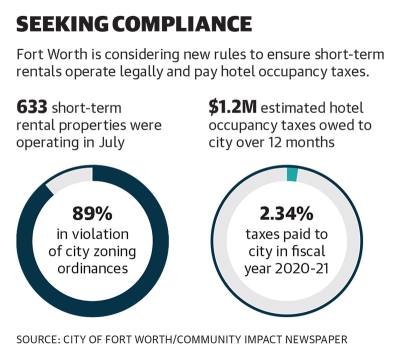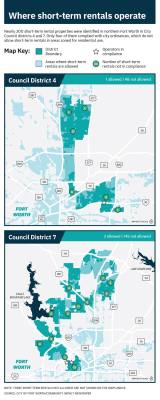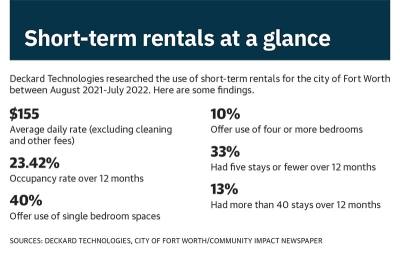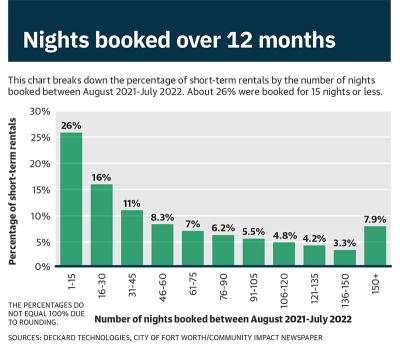The city defines short-term rentals as residential properties used for overnight stays of between one and 29 days at a time. Most are advertised through mobile apps, such as Airbnb or Vrbo.
In February 2018 council passed an ordinance that spelled out where short-term rentals may operate. They are allowed in areas zoned for mixed use or for commercial or industrial uses. They are also allowed in certain form-based districts that have a mix of residential and commercial uses. Short-term rentals are not allowed in residential areas, according to city officials.
“I expect we’ll find that most of the short-term rentals that we have in Fort Worth are not legal,” Assistant City Manager Dana Burghdoff said during a presentation in late July.
At an Aug. 16 work session, Burghdoff outlined three key questions that council will have to decide.
First, staff is recommending that short-term rentals be required to register with the city and pay local hotel occupancy taxes. The city is looking at online systems to make registration go smoothly. Those operating in areas where short-term rentals are not allowed would not be able to register nor would they be able to pay the required taxes, according to the city’s proposal.
Next, council will have to decide whether to impose any operating standards on short-term rentals. Some of those recommended by staff include a required parking plan, a limit on the number of guests, a ban on parties and events, a 24/7 contact on file and safety measures, such as smoke and carbon monoxide detectors.
The third main issue is whether to change the city’s zoning ordinances that determine where short-term rentals are allowed to operate. Staff has proposed four options, including one that continues to ban short-term rentals in all residential areas.
“This is a really tough topic,” Mayor Mattie Parker said at the work session. “We need to get this right, and I don’t think speed is in our favor.”
Council members will continue talking with constituents, doing research and getting questions answered. A timetable for a decision has not been set.
Consultant feedback
The city hired Deckard Technologies as a consultant earlier this year to provide some basic data about short-term rentals operating in Fort Worth.
In its July report, the consultant confirmed addresses for 2,453 of the 2,738 short-term rental listings found online. Those listings were confirmed to be connected to 814 properties that operated as a short-term rental within the past 12 months. The difference in numbers indicates that some properties had multiple online listings, Burghdoff said.
The consultant found 633 of those properties operating as short-term rentals in July. Of that number, 68 were in allowed areas of Fort Worth. The other 565 were operating illegally in areas where they are not allowed, the report showed.
About one-third of the listings had five or fewer stays between August 2021-July 2022, according to the report. About 13% of them had 40 or more stays during that 12-month period, the report stated.
A majority of the short-term rentals in Fort Worth are listed on the Airbnb platform, according to Deckard Technologies.
“Short-term rentals offer Fort Worth residents a way to supplement their income and support local businesses by welcoming guests into their home, and we want to work with the city on rules that preserve these economic benefits and allow hosts to pay their fair share of taxes,” said Luis Briones, Airbnb public policy manager in Texas, in an email.
Mix of opinions
Opinions on short-term rentals are mixed. During a public hearing in late July, the city heard from short-term rental operators who say they are responsible and deserve the opportunity to use their property as they want. Others testified about problems, including noise, litter and lack of parking, from the short-term rentals located near them.
This summer, city officials logged 3,664 responses to its online feedback form about possible changes for short-term rentals, received 646 idea submissions and recorded 29,680 ratings to those proposed ideas, according to Burghdoff.
Among the city’s goals are to preserve the residential quality of neighborhoods and protect them from commercial lodging encroachment, Burghdoff said. City officials also want to ensure the health and safety of residents and guests. Collecting hotel occupancy taxes is also among the city’s goals, she said.
The 9% hotel occupancy tax that Fort Worth collects from short-term rentals goes into the city’s cultural and tourism fund. The tax money can be used only on culture- or tourism-related expenses and not on enforcement of any regulations, according to Burghdoff.
Fort Worth reported receiving $28,000 in revenue from short-term rental operators in fiscal year 2020-21. According to the consultant’s report, the city had the potential to collect more than $1.2 million from the estimated $13.3 million in revenue that short-term rental operators collected between August 2021-July 2022.
Handling violations
The city investigates violations to its short-term rental ordinance on a complaint basis. When it comes to short-term rentals, code enforcement officers must confirm that a property is being used as a short-term rental before a violation can be issued. Under the city’s standards, an online listing alone cannot be used as the basis for a violation.
In FY 2020-21, the city looked into 71 complaints involving short-term rentals. Those complaints required 278 inspections by staff to confirm whether a short-term rental occurred, according to Burghdoff.
City staff have opened 147 cases so far in FY 2021-22 involving possible zoning violations of short-term rentals. Those cases have required 710 inspections by staff trying to confirm a violation, according to city data.
Among the city’s proposals is one requiring operators to register with the city to advertise a short-term rental with an online platform.
“That will make it much easier to do the enforcement,” said Shannon Elder, an assistant director with the city’s code compliance department.
During a Q&A session in July, several residents spoke about a homeowners’ right to use their property as a short-term rental.
“Property owners within Fort Worth are subject to zoning,” Burghdoff said. “They’re not allowed to have the short-term rental activity if their zoning does not allow that use.”
Fort Worth City Council members are expected to reconvene in the coming weeks to discuss short-term rentals and give the public a proposed timeline for any changes.
View this story in the August e-edition of Community Impact Newspaper.









